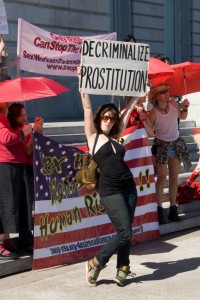Highly-acclaimed, reader-supported news site, Truthout, has once again zeroed in on a pressing matter of social justice, the continued criminalization of sex workers. Mike Ludwig‘s news analysis, well worth a full read, weaves together several different threads of this issue in terms everyone can understand.
Ludwig points our attention to “a great leap forward” in New York’s state court system that has introduced 11 new prostitution courts called Human Trafficking Intervention Courts (HTICs). These new courts were designed to treat arrested sex workers as “trafficking victims” deserving of medical and social services instead of jails, and to focus instead on the traffickers.

Flickr/creative commons
Sounds good on the surface, right? Except that sex workers have been protesting this controversial new model because: a) its premise is based on unreliable and very narrow data; b) actual data collected by sex workers rights organizations, such as the Red Umbrella Project’s recent report, “Criminal, Victim or Worker?” were flatly rejected; and, most important, c) ignores completely the need to decriminalize sex work to begin with.
Balder Rosado, a member RedUP, told Ludwig that this new court model improves what it replaced but the issue remains that access to these services necessarily starts with an arrest by police.
Not every sex worker is a sex traffic victim as anti-trafficking advocates would have us believe. For many, it is a private and personal choice that should not by criminalized in the first place, and if “treatment” is required to help those who are trafficked or otherwise coerced, it should be within a non-criminal, non-police model.
Shira Hassan, a harm reduction and transformative justice specialist in Chicago, told Ludwig . . .
. . . [A]nti-trafficking advocates often push for laws and special courts that reduce the penalties prostitution defendants face, in the name of “decriminalization.” These efforts are not about decriminalization, she said. They are about “changing the process by which someone is criminalized.”
“Criminalization is about racism, it’s about your neighborhood, it’s about how you are dressed,” Hassan told Truthout. “It’s about policing.”
The needless criminalization of sex work unfairly targets poor people of color and is as unconstitutional as “stop and frisk.” As Ludwig notes, “Police can stop individuals for ‘loitering with intent’ if they are doing as little as wearing revealing clothing or hanging out in the wrong part of town.”
HTICs can only be called a diversion program, at best. They only serve a small number of those arrested, and only a small proportion of these people actually want and need medical or social services. And the HTICs to do not prevent re-arrest for simply walking in the same neighborhood where the first arrest took place thereby nullifying the HTIC’s decision. Only a minuscule number of traffickers every get arrested.
Ludwig quotes advocate Sienna Baskin from Sex Workers Project at the Urban Justice Center in New York:
“If the emphasis is changing to be about offering services and other income options to people who are doing sex work, and intervening in violent situations, and giving people what they need without [harming them], then we need to stop criminalizing them.”
I will add another disturbing dimension, one that Ludwig overlooked or chose not to include: The retired judge, Judy Harris Kluger, who helped develop these HTICs is using the very same faulty data to promote her new business providing the services that the court recommends, reaping financial benefits from the state. Worse still, there no regulations or public standards for non-profit, short-term service providers like hers. Unfortunately, privatization schemes and conflicts of interest now pervade our justice system. Mass incarceration itself is a testimony of how special interests have managed to lobby lawmakers to privatize probation and electronic monitoring services and the prison-industrial complex itself. When will special interests like these, that thrive on increased criminality and the personal pain of others, be brought to justice?
To learn more, get involved in your community to protect sex workers rights. The decriminalization of sex work will begin the end of sexual oppression, a first step towards a world of equality and peace.
#####





